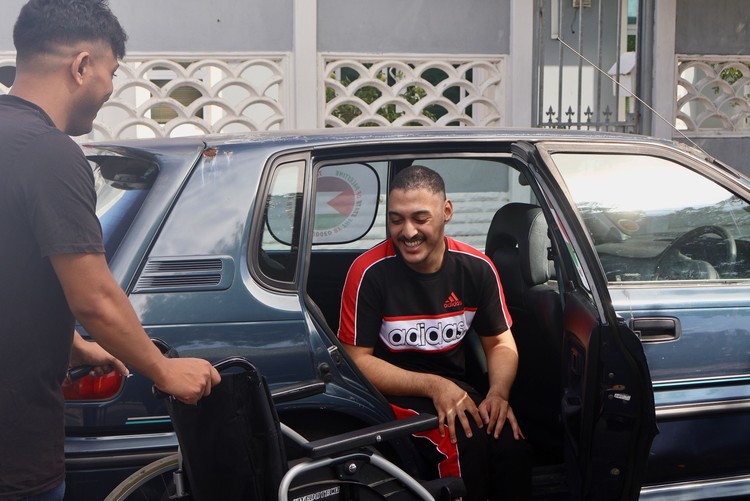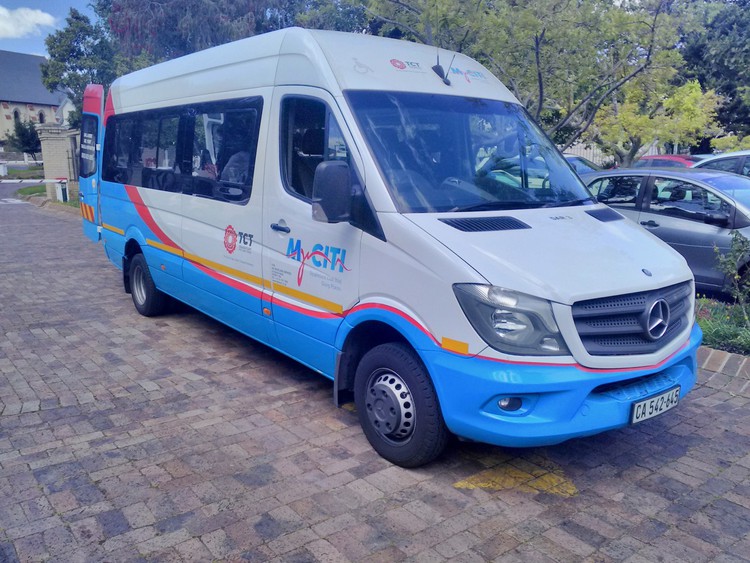People with disabilities lack accessible public transport in Cape Town
The Dial-a-Ride service has been stagnant for seven years
Robin van der Linde, a close friend to Dayyaan Edries, assists him getting into a car. Photo: Yaseen Bardien
- GroundUp spoke to a number of people with disabilities about how they get around Cape Town.
- We learned that the City’s Dial-a-Ride has been fully subscribed for seven years, that train travel is mostly inaccessible, and one takes one’s chances with minibus taxis
- The MyCiTi bus service is accessible but its network is limited and its equipment for people with disabilities needs to be kept up.
- People therefore rely on family or on e-hailing services, which those dependent on a R2,315 a month disability grant struggle to afford.
“I never had a problem with being disabled. I never thought that it’ll be a challenge, until I experienced the outside world, going into unknown spaces,” says 18-year-old Aphelele Rangula about her cerebral palsy.
Rangula was born able-bodied, but at the age of four, her life took a dramatic turn. She had seizures and was later diagnosed as having cerebral palsy, a group of neurological disorders. Today, Rangula uses a wheelchair.
She avoids public transport after she had a traumatic experience. She was in a minibus taxi and people complained about her wheelchair taking up space. “I had to get off before my destination,” she says.
Makhosandile Tumana, SANTACO Public Relations Officer for the Western Cape, says they are willing to accommodate people with disabilities such as wheelchair users, but admitted that more needed to be done.
“We understand that there are people with disabilities and we need to accommodate them.
“When the Toyota Quantum was introduced, there was space to accommodate wheelchair users but I don’t think we are doing enough to accommodate them,” he admitted.
Instead of minibus taxis, Rangula uses an e-hailing service. But living in Blue Downs makes it expensive, she says. For the most part, the drivers are kind and help her with her wheelchair.
The City of Cape Town has the Dial-a-Ride service specifically for people with disabilities. But Rangula says she applied to use it in 2019 and has never had a response.
The City told GroundUp it has no record of her application.
Mayco member for urban mobility Roberto Quintas says the service is oversubscribed due to budgetary and capacity constraints.
“The City has not accepted any new applicants since 2018 … New applicants are generally informed that the service is already oversubscribed and that a waiting list applies,” said Quintas.
Pushed further on what it would do about this, the City reiterated its response.
The City’s Dial-a-Ride service has been fully subscribed since 2018. Archive photo: Will Yoder
Meanwhile, the City of Cape Town’s MyCiTi bus service is designed to be universally accessible, with tactile paving at stops and good access. But it does not serve Rangula’s Blue Downs area.
MyCiTi buses also include allocated spaces where wheelchairs can be strapped safely while the bus is moving. The bus has induction loops at ticket kiosks, a device that transmits sound from the server inside the kiosk directly to people with hearing aids.
GroundUp requested statistics from MyCiTi regarding the number of commuters with disabilities using the service, but there is no specific data collected.
Rangula receives a SASSA disability grant, which recently increased to R2,315 per month. But after transport costs and groceries for her household of six, there is little left.
She has struggled to find a job. Getting accessible transport to workplaces creates an additional hurdle.
“I think that there is a fear of employing disabled people,” says Dayyaan Edries, from Bo-Kaap. He was born with cerebral palsy and uses a wheelchair.
“I’ve been looking for a job for over a year and I’ve only recently got into a learnership,” he says.
“I do believe that the government is aware of issues facing disabled people. They are making changes, but many would say that it’s not enough because there are still some places that are inaccessible,” says Edries.
He receives a disability grant and a grant-in-aid, totalling R2,845 a month.
But it is insufficient and family support is essential.
MyCiTi has no bus stop near enough to his home. He relies on his father for transport.
Jeremy Hazell, a Western Cape Network on Disability member, praised the space allocated for wheelchair users in MyCiti buses, the safety of the service, and the ease of access to get on and off the bus.
Anthony Ghillino, who is quadriplegic and a board member for Western Cape Network on Disability, gives MyCiTi a mixed review. He says that it’s a positive step that MyCiTi caters for people in wheelchairs. But there are sometimes issues with equipment not working. Belts do not fully tighten around some wheelchairs.
The only other alternative is the railway system. But this is particularly challenging for people with mobility difficulties. Many train stations are inaccessible to wheelchairs. They have numerous stairways, few ramps or working elevators, with some being out of order for years.
Zino Mihi, PRASA and Metrorail spokesperson, says improvements are in the pipeline and they have engaged a consultant on universal access. The project will look at three different areas: station access, platform access, and platform train interface.
No timeline was given regarding the project, as it is only starting.
Nontsasa Mteza, who joined Disability Revolution a year ago, an organisation that aims to tackle health, transport and education issues for people with disabilities, says the disability grant is “not enough” money.
Mteza says education including braille and audiobooks, and transport are needed. She says Dial-a-Ride is insufficient, and most public transport does not cater for people with disabilities.
She believes more can be done by the government. She feels the media has an important role and should raise awareness of the issues that face people with disabilities on transport, housing and public spaces.
Sibongiseni Faku, managing director of Freedom to the Forgotten, an organisation campaigning for people with disabilities, says they don’t feel adequately supported by the government. Faku said their pleas often fall on deaf ears.
“We need to be recognised and fairly treated. We need extra income because we have families. We cannot rely on the disability grant,” he said. “We want the government to sit down with us.”
Support independent journalism
Donate using Payfast

Don't miss out on the latest news
We respect your privacy, and promise we won't spam you.
Next: Three common myths about US funding cuts to South Africa
Previous: Quick explainer: government debt and why it matters
Letters
Dear Editor
My child was on the approved list on DAR but there was never a chance to use the service as they kept giving excuses. When we desperately needed the service in 2017 due to a decline in her condition and the multiple hospital appointments in January, February and March, I reached out and they said that she was removed from the list and had to be reassessed to be eligible. The application was made by RXH and how do you reassess a patient who is permanently disabled – quadriplegic? I gave up on fighting with the City of Cape Town. I went in February 2025 to get a disability disk for parking only to be told the tender is out so there are no disks. Honestly... I am tired.
© 2025 GroundUp. This article is licensed under a Creative Commons Attribution-NoDerivatives 4.0 International License.
You may republish this article, so long as you credit the authors and GroundUp, and do not change the text. Please include a link back to the original article.
We put an invisible pixel in the article so that we can count traffic to republishers. All analytics tools are solely on our servers. We do not give our logs to any third party. Logs are deleted after two weeks. We do not use any IP address identifying information except to count regional traffic. We are solely interested in counting hits, not tracking users. If you republish, please do not delete the invisible pixel.


